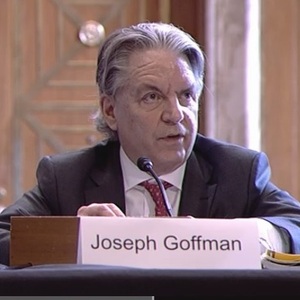Senate committee members question Goffman on RFS, SREs




May 25, 2022
BY Erin Krueger
Joseph Goffman expressed support for the Renewable Fuel Standard and the use of biofuels during a May 25 hearing held by the Senate Committee on Environment and Public Works to consider his nomination to serve as assistant administrator for the EPA’s Office of Air and Radiation. He also provided an update on the EPA’s small refinery exemption (SRE) policy.
During the hearing, Sen. Joni Ernst, R-Iowa, spoke about current high gas prices and their impact on consumers. “If we take advantage of biofuel, we have the ability to pursue an energy strategy that creates jobs and creates reliable and affordable energy to American families—energy that is grown right here in the United States,” she said. “Ethanol is already blended into almost every gallon of gasoline sold in the U.S. and we have abundant supplies, coincidently at a lower price. So, not only is it good for the environment, but it’s also cheaper.”
Ernst expressed concerns over past statements Goffman has made about the RFS, quoting him as calling the program “not successful,” “a bit of a blunderbuss,” and “an uncertainty plagued mechanism for providing subsidies for the ag sector.” Ernst discussed President Biden’s support for biofuels and asked Goffman to set the record straight regarding his position on the RFS by answering a series of yes or no questions on his agreement with Biden’s position on the important role biofuels serve.
When asked by Ernst whether he agrees with Biden’s position that biofuels reduce U.S. reliance on foreign oil, Goffman responded by saying “emphatically, yes.” He also confirmed that he agrees with Biden’s positions that biofuels are less harmful to the environment and reduce greenhouse gas (GHG) emissions; that biofuels have a role to play as the administration works to get fuel prices under control; and that the U.S. cannot achieve net-zero emissions by 2050 without biofuels.
Advertisement
Sen. Jim Inhofe, R-Okla., also addressed the RFS during the hearing, focusing on the program’s small refinery exemption (SRE) provisions.
Goffman called the SREs a “complicated issue” and welcomed the opportunity to provide the committee with an update of the program. He also noted the federal courts have weighed in on EPA’s administration of the program, which has informed recent actions taken by the agency with respect to SREs.
“I think I understand why—given what people are facing at the pump right now—everybody would be wondering whether the actions we’re proposing to take—and in some cases took—with respect to small refineries is going to have an impact in making matters worse for drivers,” Goffman said. “I believe the answer is no.”
It’s really important, he said, to pay attention to precisely what the agency’s authority to address hardship is and isn’t. You’ve also got to pay attention to our own analysis and impact of the RFS program on fuel markets, he added. The agency’s proposed denial of more than 60 SRE petitions in December 2021 was issued in response to remands handed down by the courts. “What were trying to do in December was to respond to those remands, lay out our thinking, lay out our analysis, and then ask the small refinery applicants to respond to what we had proposed and provide additional information in support of their applications,” Goffman said. He also noted that through the December proposal, the EPA tried to provide a comprehensive explanation of how the agency now understands its authority with regard to SREs, what the agency is obligated to do, and what the federal courts have told the agency its limits to that authority are. The agency in April denied 36 of those SREs, including overturning 31 SREs that had previously been approved.
Goffman noted that numerous SRE petitions are still pending. He said the agency plans to issue a decision on those petitions shortly and “in doing so really be clear once and for all what the law is, what our analysis shows, and provide certainty for all stakeholders in the RFS program as to what the road going forward looks like.”
Advertisement
The Advanced Biofuels Association, the Coalition for Renewable Natural Gas, the Low Carbon Fuels Coalition, the National Air Transportation Association, Alder Fuels, EcoEngineers, Gevo, Oberon Fuels and World Energy on May 25 sent a letter to committee leadership expressing support for Goffman’s confirmation to the EPA post. The letter highlights Goffman’s stakeholder engagement, negotiation, and problem-solving experience as critical assets to ensuring the EPA regulates transparently and effectively, delivering strong and defensible policy to protect public health and the environment. The letter explains that his ability to solve for meaningful and durable implementation of the law makes Goffman a strong choice to lead the Office of Air and Radiation, where regulatory certainty is particularly important to industries that operate on long-term investment horizons like the advanced biofuels sector.
“The EPA’s leadership has never been more important to strengthen the U.S.’s advanced biofuels sector, thereby increasing the U.S.’s energy independence and reducing our transportation sector’s greenhouse gas (GHG) emissions footprint,” said Michael McAdams, president of the ABFA. “From my decades of experience in renewable energy, I can confidently say that Mr. Goffman has the dedication and drive to tackle this challenge.”
A full replay of the hearing is available on the Senate Committee on Environment and Public Works website.
Upcoming Events





